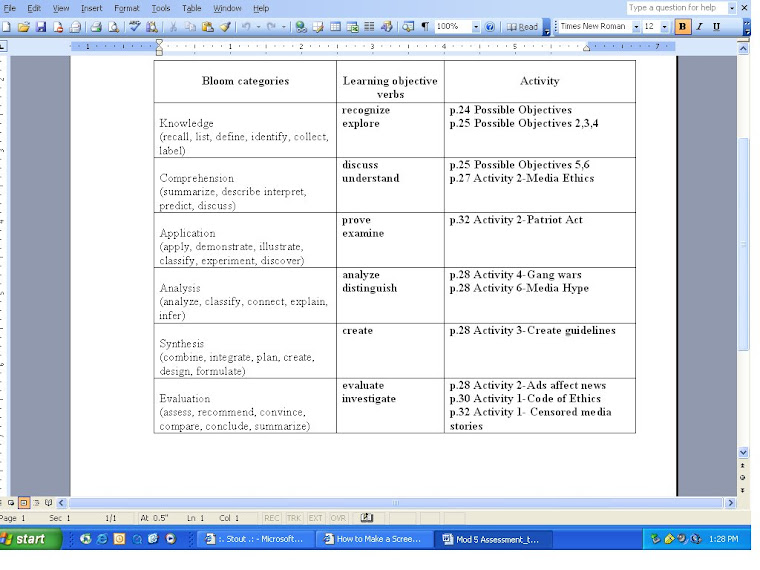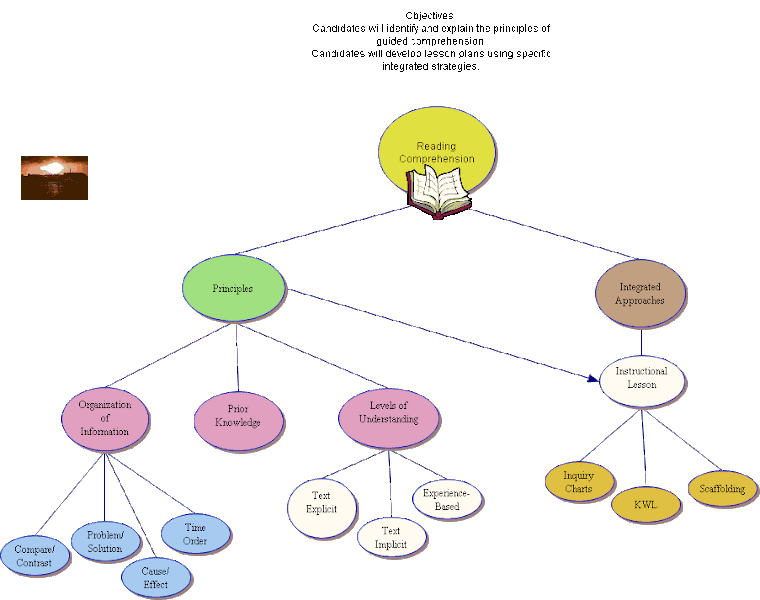Reflection: Module 2
I have enjoyed the activities and discussions this week. While initially I wondered what I would post to my blog, through the readings, discussions, and visiting my classmates’ blogs, I have gained a better idea.
Some thoughts about the use of course blogging –
In the Lee and Allen (2006) article, Edublogs as an online assessment_tool the authors state that before using edublogs for assessment, specific objectives and learning outcomes must be determined. They state that blogs can expand the learning process through self-assessment and reading of peer blogs.
Hurlburt, in Defining Tools for a New Learning Space (2008) offers suggestions for successful blog assignments. The potential of a blog “… is not an automatic consequence of using or assigning the technology.” Assignments do not “automatically become interactive assignments.” The implications are that blogs have to be carefully designed to achieve an interactive structure. Further, the author suggests that students need reassurance during the process and an atmosphere of trust and safety should prevail.
I’m planning to introduce a blogging assignment into one of courses I teach, and so it will be very useful to me to focus on the structure of the assignment in order to produce a successful outcome
Sunday, June 29, 2008
Thursday, June 26, 2008
Module 2: A Discussion of the Wang and Fang (2005) Study
The purpose of the study, Benefits of Cooperative Learning in Weblog Networks, Wang and Fang (2005) was two-fold. The first was to find ways to integrate cooperative learning with computer technology in a foreign language class, and the second, to determine how students might benefit in the college writing curriculum from this integration. Blogs were used as a place where students could share ideas individually or in groups. The authors hypothesized that increasing the students’ time writing would increase their proficiency.
The results of the study, as reported by the authors, showed that students felt the experience of blogging fostered confidence in their writing ability, and felt they contributed to their group’s efforts, and their personal goals. However, an overwhelming number, 91%, still felt that face to face interaction was an important ingredient in supporting each other, and reaching goals.
I feel this study exhibited some disadvantages, which could inform my practice in planning for my online classes.
· The study did not include a method to evaluate the quality of the online communication. More time spent writing doesn’t necessarily equal better writing. The quality of work produced would be an important element for me to consider in my classes.
· The study also did not provide an analysis of student improvement in the area of foreign language facility. This seems to be an objective without an outcome.
· The results of the study depend on a self-reported questionnaire given to the students of whom 77.6% responded. However, there was no report of student assessment by the instructors. This is a piece I think is necessary to support the teaching-learning process.
· The authors seem to have many expectations of the students. They had to articulate their own learning, reflect upon it, engage in discourse with other learners, work in groups to develop a project or to participate in a debate, read resources, post online, read others’ postings, attend face to face lectures, attend to course work given online, all within the framework of foreign language practice. With so many initiatives, it is difficult to draw conclusions directly linking cooperative learning with computer technology. A large percentage of students (42.2, 28.9, 25 %) took a neutral stance in answering the questions concerning their ability to manage time in this setting. Could this be the result of the study design trying to do too much at once?
· More than 1/3 of the students responded “neutral” to many of the learner autonomy and cooperative learning questions. Perhaps these students were not fully prepared for the cooperative learning-computer technology format. Consideration must always be given to practicing new skills before students are required to use them and a useful thought to keep in mind. For me, the goal is always that all students be prepared for the learning experience.
The results of the study, as reported by the authors, showed that students felt the experience of blogging fostered confidence in their writing ability, and felt they contributed to their group’s efforts, and their personal goals. However, an overwhelming number, 91%, still felt that face to face interaction was an important ingredient in supporting each other, and reaching goals.
I feel this study exhibited some disadvantages, which could inform my practice in planning for my online classes.
· The study did not include a method to evaluate the quality of the online communication. More time spent writing doesn’t necessarily equal better writing. The quality of work produced would be an important element for me to consider in my classes.
· The study also did not provide an analysis of student improvement in the area of foreign language facility. This seems to be an objective without an outcome.
· The results of the study depend on a self-reported questionnaire given to the students of whom 77.6% responded. However, there was no report of student assessment by the instructors. This is a piece I think is necessary to support the teaching-learning process.
· The authors seem to have many expectations of the students. They had to articulate their own learning, reflect upon it, engage in discourse with other learners, work in groups to develop a project or to participate in a debate, read resources, post online, read others’ postings, attend face to face lectures, attend to course work given online, all within the framework of foreign language practice. With so many initiatives, it is difficult to draw conclusions directly linking cooperative learning with computer technology. A large percentage of students (42.2, 28.9, 25 %) took a neutral stance in answering the questions concerning their ability to manage time in this setting. Could this be the result of the study design trying to do too much at once?
· More than 1/3 of the students responded “neutral” to many of the learner autonomy and cooperative learning questions. Perhaps these students were not fully prepared for the cooperative learning-computer technology format. Consideration must always be given to practicing new skills before students are required to use them and a useful thought to keep in mind. For me, the goal is always that all students be prepared for the learning experience.
Module 1: Reflection
Assessment Readings
McLoughlin – “Technology has "the capacity of offer learners a broad array of activities, tasks, and forums for engaging in constructivist learning".
Black & Williams – “…improving formative assessment raises student achievement.”
My interest in alternative assessments, and my immediate need for my work is the area of formative assessment. My college has put assessment high on its priorities as it has recently gone through a Middle States evaluation. The Division of Education, where I teach, similarly has just finished an accreditation visit by New York State, and has hired a new director of assessment.
Consequently, I was most interested in the Black article. Black mentions good questioning as one of the ways to assess student learning. I was happy to see this since I stress questioning technique with my graduate students. They usually respond by saying they never realized how difficult it can be to construct a good question – nor how valuable. Like McLoughlin, he also stresses peer assessment and self-assessment-“Students can achieve a learning goal only if they understand that goal and can assess what they need to do to reach it.”
The McLoughlin article- this was an interesting discussion about how alternative assessment has been accelerated by technology, and how it learners can build their own knowledge. Mc Loughlin states that “In constructivist learning environments there is social interaction, communication, exchange of views, collaboration, and support for learners to take more responsibility for the learning process through learner-centered tasks.” This has been my experience in teaching online classes. I am often asked by students who may never have tried an online class or by dubious faculty if an online course can be truly worthwhile. I tell them that the format supports more interaction than in any f2f class. Additionally, it supports opportunity to learn new skills through real life activities.
I liked all three assessments, the interview, the survey, and the wiki. I think their usefulness depends on the purpose, as each has its drawbacks. However, they all require direct involvement by the learner.
McLoughlin – “Technology has "the capacity of offer learners a broad array of activities, tasks, and forums for engaging in constructivist learning".
Black & Williams – “…improving formative assessment raises student achievement.”
My interest in alternative assessments, and my immediate need for my work is the area of formative assessment. My college has put assessment high on its priorities as it has recently gone through a Middle States evaluation. The Division of Education, where I teach, similarly has just finished an accreditation visit by New York State, and has hired a new director of assessment.
Consequently, I was most interested in the Black article. Black mentions good questioning as one of the ways to assess student learning. I was happy to see this since I stress questioning technique with my graduate students. They usually respond by saying they never realized how difficult it can be to construct a good question – nor how valuable. Like McLoughlin, he also stresses peer assessment and self-assessment-“Students can achieve a learning goal only if they understand that goal and can assess what they need to do to reach it.”
The McLoughlin article- this was an interesting discussion about how alternative assessment has been accelerated by technology, and how it learners can build their own knowledge. Mc Loughlin states that “In constructivist learning environments there is social interaction, communication, exchange of views, collaboration, and support for learners to take more responsibility for the learning process through learner-centered tasks.” This has been my experience in teaching online classes. I am often asked by students who may never have tried an online class or by dubious faculty if an online course can be truly worthwhile. I tell them that the format supports more interaction than in any f2f class. Additionally, it supports opportunity to learn new skills through real life activities.
I liked all three assessments, the interview, the survey, and the wiki. I think their usefulness depends on the purpose, as each has its drawbacks. However, they all require direct involvement by the learner.
Subscribe to:
Comments (Atom)


